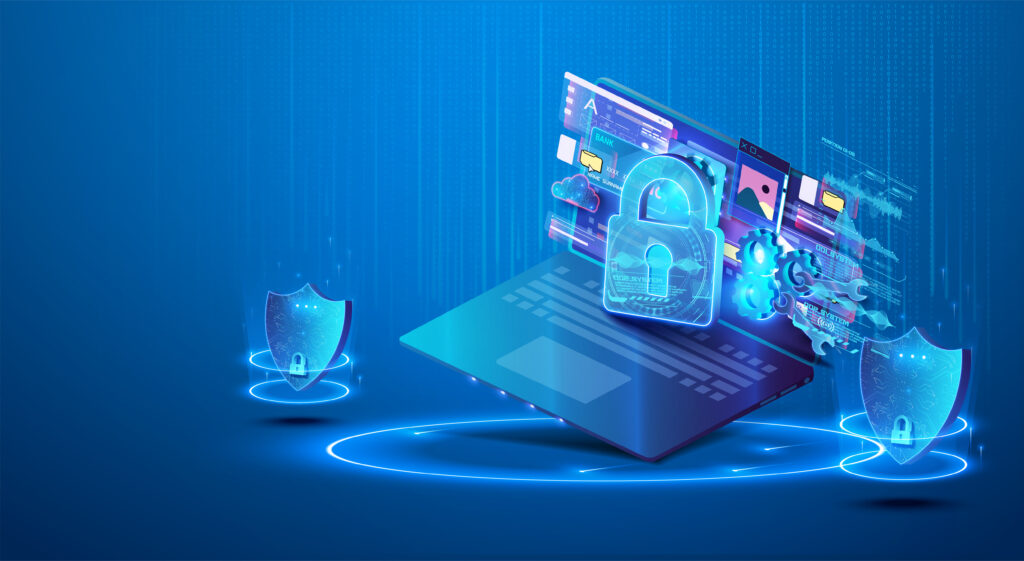Cyber Security
In today’s interconnected world, where digital technologies shape every aspect of our lives, cyber security is of paramount importance. At Fusion, we take pride in offering comprehensive cyber security solutions to businesses of all sizes. Our mission is to protect your valuable data, applications, and networks from ever-evolving cyber threats.
Our Core Cyber Security Services
Cyber Security
Cyber security lies at the core of everything we do. Our team of cyber security experts possess the knowledge and expertise to safeguard your digital assets. We believe in proactive defense, continually updating our strategies to counter new and emerging threats.
Cloud Security
Cloud computing brings immense benefits, but it also introduces security challenges. Our cloud security solutions offer robust protection for your data stored in cloud environments. Rest assured that your sensitive information remains secure and accessible only to authorised users.
Network Security
Your network acts as the backbone of your digital infrastructure. Our network security services leverage cutting-edge technologies and best practices to detect and prevent unauthorised access, data breaches, and other cyber threats. We build a fortified network defense, ensuring that your critical assets stay safe.
Mobile Security
With the prevalence of mobile devices, securing them is more critical than ever. Our mobile security solutions safeguard your smartphones and tablets from mobile-specific threats, protecting your data and privacy on the go.



Threat Intelligence and Detection
Cyber Threats
The cyber threat landscape is constantly evolving, and attackers continuously refine their techniques. At Fusion, we stay ahead of these threats, leveraging threat intelligence to detect and neutralise potential risks before they can cause harm. See 2023’s Top Cyber Security Threats for the latest trends in the threat landscape.
Endpoint Security
Endpoints such as laptops and smartphones are common targets for cyber attacks. Our endpoint security solutions provide robust protection against malware, ransomware, and other threats, ensuring that your devices and data remain secure.



Comprehensive Security Solutions
Security Solutions
Fusion offers a comprehensive suite of security solutions tailored to meet your specific needs. From vulnerability assessments to incident response, we cover all aspects of cyber security to ensure complete protection.
Risk Management
Effective risk management is at the heart of our approach. We conduct thorough risk assessments to identify vulnerabilities and develop strategies to mitigate potential risks, providing you with enhanced cyber resilience.
Frequently Asked Cyber Security Questions
What does Cyber Security do?
Cyber security is a field dedicated to protecting computer systems, networks, data, and digital assets from unauthorised access, attacks, damage, and other potential threats posed by cybercriminals and malicious entities. Its primary goal is to ensure the confidentiality, integrity, and availability of information and resources in the digital realm. Cyber security employs various technologies, practices, and processes to safeguard individuals, organisations, and governments from cyber threats.
Key functions of Cyber Security
Identifying Vulnerabilities: Cyber security professionals continuously analyse systems and networks to identify potential vulnerabilities or weaknesses that could be exploited by attackers.
Preventing Unauthorised Access: Implementing strong access control measures, such as passwords, multi-factor authentication, and encryption, to ensure only authorised users can access sensitive information.
Protecting Against Malware: Deploying antivirus software and other security tools to detect and remove malicious software, such as viruses, ransomware, and spyware, that can compromise systems and data.
Securing Networks: Establishing firewalls, intrusion detection and prevention systems, and other network security measures to defend against unauthorised access and data breaches.
Monitoring and Incident Response: Continuously monitoring systems and networks for suspicious activities and promptly responding to security incidents to mitigate their impact.
Educating Users: Providing security awareness training to users to recognise and avoid phishing attacks, social engineering, and other common cyber threats.
Data Protection: Encrypting sensitive data, both in transit and at rest, to prevent unauthorised access even if the data is compromised.
Securing Cloud Environments: Ensuring that data and applications hosted in cloud environments are protected from unauthorised access and data breaches.
Mobile Security: Implementing measures to secure mobile devices and applications from cyber threats, especially as mobile usage continues to rise.
Endpoint Security: Protecting endpoints (e.g., laptops, smartphones) from malware and unauthorised access, as they are common targets for cyber attacks.
Threat Intelligence: Gathering and analysing information about emerging cyber threats to stay ahead of potential attacks.
Penetration Testing: Conducting controlled tests to identify and fix vulnerabilities before attackers can exploit them.
Overall, cyber security is an ever-evolving field that adapts to the changing threat landscape to ensure the safety and integrity of digital assets and the overall protection of individuals and organisations from cyber risks.
What is a cyber security company?
A cyber security company is an organisation that specialises in providing products, services, and solutions aimed at protecting individuals, businesses, governments, and other entities from cyber threats and attacks. These companies focus on addressing the ever-growing and diverse range of risks and vulnerabilities in the digital landscape.
Key functions and services offered by cyber security companies
Security Solutions: They offer a wide array of security products and software to protect against various cyber threats, such as antivirus software, firewalls, intrusion detection systems (IDS), encryption tools, and more.
Managed Security Services (MSS): Some cyber security companies provide managed security services, wherein they remotely monitor, manage, and respond to security incidents on behalf of their clients, allowing organizations to focus on their core operations while outsourcing their security needs.
Consulting and Advisory Services: Cyber security companies may offer consulting services to help organizations identify security weaknesses, assess risks, and develop effective security strategies and policies.
Vulnerability Assessments and Penetration Testing: They conduct assessments to identify vulnerabilities in systems and networks, and perform ethical hacking (penetration testing) to simulate real-world attacks and gauge the organization’s security posture.
Incident Response and Forensics: These companies offer incident response services to help organizations quickly and effectively respond to and mitigate security incidents. They also provide digital forensics to investigate cyber incidents and gather evidence for potential legal action.
Security Awareness Training: Some companies provide training programs to educate employees and users about cyber security best practices, raising awareness to prevent social engineering attacks like phishing.
Cloud Security Services: They focus on securing cloud environments, ensuring data privacy and compliance for businesses leveraging cloud-based services.
Endpoint Security: Cyber security companies offer solutions and services to protect individual devices (endpoints) like laptops, smartphones, and IoT devices from malware and other threats.
Threat Intelligence: They gather and analyse cyber threat intelligence to stay ahead of emerging threats and provide proactive defense measures.
Identity and Access Management (IAM): These companies may offer IAM solutions to manage user access and permissions to ensure only authorised individuals can access critical resources.
Overall, cyber security companies play a crucial role in helping individuals and organisations fortify their defenses against cyber threats, safeguarding sensitive data, and maintaining business continuity in the digital age.
What are the 5 types of Cyber Security?
Cyber security can be broadly categorised into five main types or domains, each focusing on specific aspects of protecting digital assets and information:
5 types of Cyber Security
Network Security: Network security involves protecting the integrity, confidentiality, and availability of data and resources transmitted over computer networks. It includes measures such as firewalls, intrusion detection and prevention systems (IDPS), virtual private networks (VPNs), and network segmentation to defend against unauthorised access, data breaches, and cyber attacks.
Information Security: Information security focuses on safeguarding data from unauthorised access, disclosure, alteration, or destruction. It includes encryption, access controls, data classification, and data loss prevention (DLP) solutions to protect sensitive information and ensure data privacy and confidentiality.
Endpoint Security: Endpoint security is concerned with securing individual devices (endpoints) such as laptops, desktops, smartphones, and other Internet of Things (IoT) devices. It involves installing antivirus software, endpoint protection platforms, and other security measures to protect these devices from malware, ransomware, and other cyber threats.
Application Security: Application security focuses on identifying and addressing vulnerabilities in software and applications. It includes secure coding practices, code reviews, and application security testing, such as penetration testing and vulnerability assessments, to prevent potential exploits and data breaches.
Cloud Security: Cloud security deals with protecting data, applications, and services hosted in cloud environments. It encompasses measures to ensure data privacy, data integrity, and compliance with security standards in cloud platforms. Cloud security solutions often involve encryption, identity access management (IAM), and cloud-specific security controls.
It is essential to note that cyber security is a complex and constantly evolving field, and these categories may overlap or have sub-domains as new threats and technologies emerge. To achieve comprehensive protection, organisations often integrate multiple types of cyber security measures to address various aspects of their digital infrastructure.
Why Choose Fusion IT Management?
- Expert Team: Our team consists of highly skilled and certified cyber security professionals who are passionate about securing your digital assets.
- Proactive Approach: We believe in staying ahead of cyber threats by employing proactive measures, ensuring that you are protected before an attack occurs.
- Customised Solutions: We understand that each client’s cyber security requirements are unique. Our tailored solutions are designed to cater to your specific needs.
- 24/7 Support: Cyber threats can strike at any time. Our dedicated support team is available 24/7 to assist you in any security-related emergencies.
Take Charge of Your Cyber Security
Secure your digital future with Fusion IT Management. Contact us today on 0333 241 4123 or email [email protected] to discuss your cyber security needs and let our experts empower you with the most advanced solutions for a safer digital world. Trust us to be your reliable cyber security partner!
